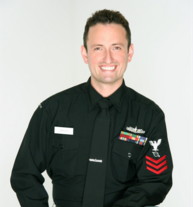|

|
Mike
Brazell's Life in
the Modern Navy
by
Mike
Brazell and Denny Meyer
|
Mike Brazell
joined the United States Navy, right out of high
school, at the age of 18. He served
honorably for ten years, recently from 1996 to
2006, as an Operations Specialist handling such
things as radar, ship navigation and message
traffic. When he left the service, he was a
Petty Officer First Class (E-6) and was an
instructor teaching his skills to new
recruits. He is gay and nearly all of his
peers in the Navy knew that and worked alongside
him and socialized with him; he never encountered
overt discrimination. And yet, even with the
affirmation and full acceptance of his peers, the
prevailing officially endorsed environment of
discrimination ultimately led him to leave the
service for freedom. The loss of his
experience, knowledge, training, and leadership is
worth a fortune. The skills and abilities he
developed in the Navy were so advantageous that
when he leapt from his Navy career, he had a
leading position in a proactively inclusive
civilian organization even before his feet hit the
ground outside.
Mike grew up
in South America and later in a small town in
South Carolina. In his multi-ethnic and
bilingual home, loving intelligent egalitarianism
prevailed. An yet, life in a small South
Carolina town in the 1990s was still not a place
where a young gay man could be himself. He
joined the Navy to seek freedom, to escape the
confines of small town life, and to see the
world. Remarkably, all of that came true for
him, not in small part due to the strength of his
own character.
Mike joined
the armed forces out of patriotism as well,
wanting to do his part in serving his country;
influenced partly by the mystique of the Navy; but
primarily by his stepfather and one of his
teachers, who were Vietnam Vets.
His first
two assignments were on guided missile
destroyers. He was first based in Tokyo
Japan, and later in San Diego, CA. As with
many young gay men since World War II, his first
true coming out was while he was in the service,
out in the world away from home. In Japan,
he went out with other gay sailors, some of whom
wore quite fashionable cloths and even carried-on
and camped gayly while off duty out on the
town at night. Some of these young sailors
maintained a rather overt campy demeanor even
while on duty in the shipboard environment.
No one seemed to care; the one thing they all had
in common was doing their jobs well, and that was
what seemed to be the only thing that
mattered. This attitude amongst peers and
immediate superiors down at the real world level
of human interaction, distant from the ideological
concepts of pseudo-morality of administration
politics, reflected the changing attitudes in
America and amongst service members. A
recent Zogyby poll revealed that fully 75 percent
of young service members were totally unconcerned
about the sexual orientation of their peers.
Indeed, even straight fellow sailors went out
socializing, regularly, with him and his more
overtly gay friends.
Remarkably,
in the moralizing homophobic era of the current
administration, aboard these Navy ships gay
sailors lived openly and fully accepted by their
peers. And so, Petty Officer Brazell bravely
reenlisted, after four years, for another six year
tour of duty in the United States Navy. He
knew that there was a risk that things might not
always be so much like the family atmosphere
aboard the smaller naval vessels on which he had
served; that the constrained closet of serving in
silence might be required to survive on shore
duty. And yet, despite all that and having a
long term lover, he continued his service in the
Navy which had become his career. He had had
encouraging experiences in which homophobic peers
had "changed their minds" and come to
see him and other gay shipmates as simply ordinary
fellow sailors.
Yet, on
shore duty, in his final assignment as an
instructor, the atmosphere lacked the unit
cohesion of shipboard life; it was more policy
driven, i.e., more homophobic. There was the
assumption, amongst some of his fellow
instructors, that it was perfectly acceptable, and
officially approved of, for them to make common
crude homophobic remarks and express contempt for
homosexuals and for some student seamen whom they
assumed were homosexual. He knew enough to
feel constrained in this situation. His Camelot
life ceased and the closet door closed for the
first time in his experience.
With his
future civilian employer clamoring for his service
as a clever openly gay employee, there was no
reason for this highly skilled young man in his
late twenties to spend one more day than he was
obligated to in the Navy. His only regret
was in leaving the new young gay recruit students
in the hands of the homophobes who would certainly
not provide the positive healthy experience he had
had in his early years in the Navy.
After he
began his civilian life as an openly gay activist
speaking out publicly for rights; he heard from
some straight former peers in the service to whom
he had not been out. They were deeply
offended, not at having unknowingly served with a
homosexual but, because he had not seen fit to be
open with them!
It would
seem quite clearly that the time has come for
Pentagon policymakers and Congressional lawmakers
to catch up with reality and remove the ban on
open gay service by patriotic American volunteers.
Mike Brazell
is a campaign coordinator for PETA, the animal
rights organization.
|
![]()